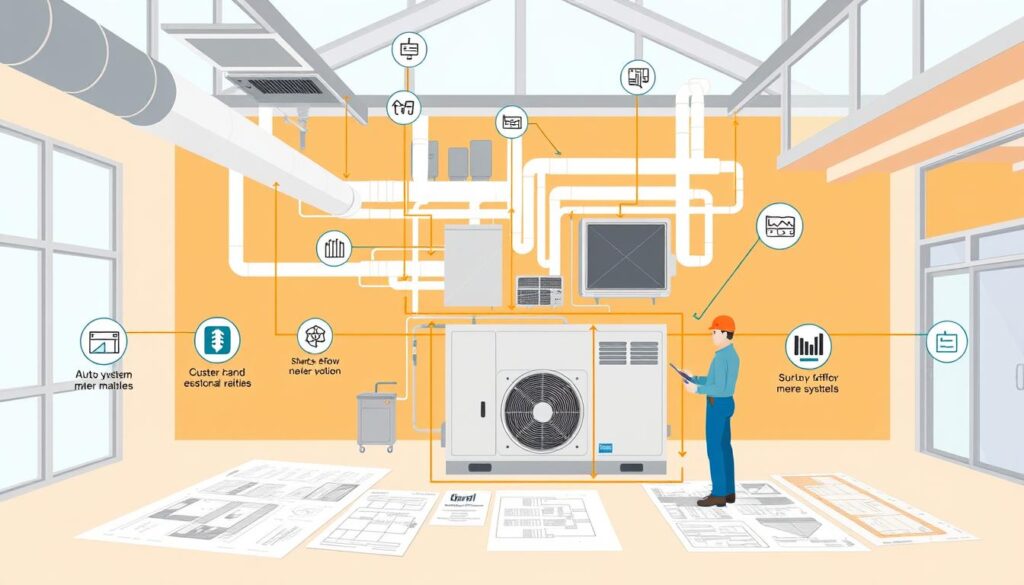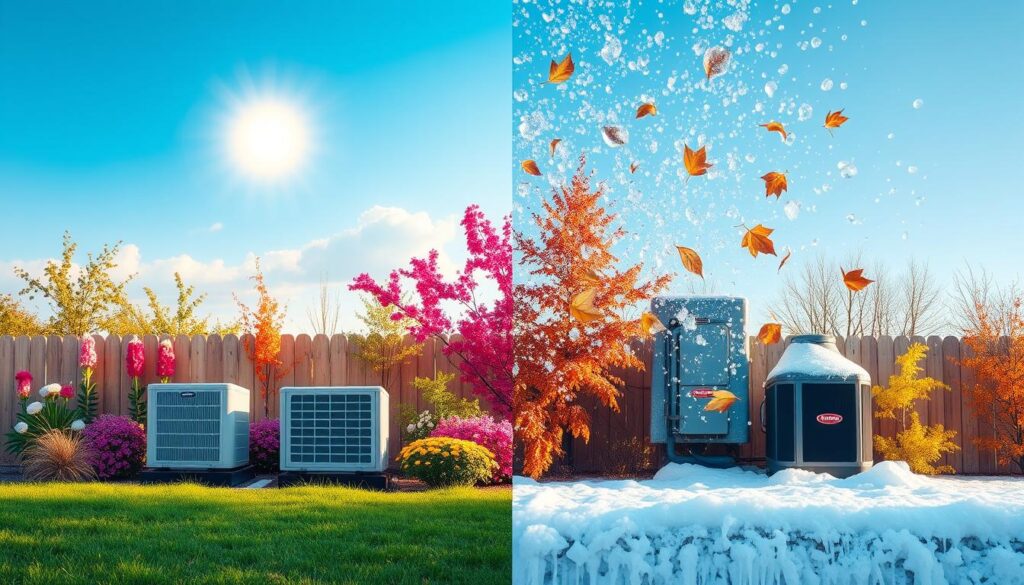Affiliate Disclosure
HVAC Guide Guys is a participant in the Amazon Services LLC Associates Program, an affiliate advertising program designed to provide a means for sites to earn advertising fees by advertising and linking to Amazon.
Are HVAC Estimates Free? Thinking about HVAC replacement? You might wonder, “Are HVAC estimates free?” Knowing the cost is key to making a smart choice and avoiding surprises. This guide will cover HVAC estimates, what they include, and why a pro’s opinion matters. You’ll learn to navigate HVAC estimates like a pro and choose wisely for your home.

Key Takeaways
- HVAC estimates are often free from reputable companies to help you decide.
- They detail the cost of equipment, labor, and extra fees, showing the total project cost.
- Experts ensure your system fits right and saves energy, improving comfort and saving money long-term.
- Being ready with info for your HVAC estimate can lead to a more accurate and helpful suggestion.
- Things like system size, energy ratings, and how complex the install are can change the cost a lot.
Table of Contents
Understanding HVAC Estimates and Their Cost Structure
When you’re looking into HVAC installations or replacements, knowing about estimates is key. These estimates look at your current system’s size, energy efficiency, and how hard it is to install. A standard estimate will check your current system, suggest a new one, and give you a cost idea.
Types of HVAC Estimates Available
HVAC contractors offer different estimates to help homeowners choose wisely. These include:
- Online estimates: Many HVAC companies have free online tools. They give a rough idea based on your home’s size and basic details.
- In-person estimates: A pro HVAC technician will come to your home. They’ll check your current system and give a detailed estimate for a new one or repairs.
- Detailed written estimates: After the visit, the HVAC company will give a detailed written estimate. It will include the recommended system, labor costs, and total price.
What’s Included in a Standard Estimate
A standard HVAC estimate includes several key points:
- System size requirements: The estimate will figure out the right size for your HVAC system. It looks at your home’s size and insulation.
- Energy efficiency ratings: The estimate will look at the energy efficiency of the recommended system. It uses SEER ratings and others.
- Installation complexity: The estimate will consider any special features of your home or current system. These can affect the installation cost and process.
The Value of Professional Assessment
While online estimates are a good start, a professional HVAC assessment is crucial. A pro evaluation can find hidden issues, suggest the best system size, and recommend energy-saving upgrades. This can lead to big savings on energy bills and maintenance costs over time.
| Metric | Value |
|---|---|
| Percentage of homeowners and HVAC technicians who recommend receiving a minimum of three HVAC estimates | Majority |
| Average savings from requesting multiple HVAC estimates | Hundreds to thousands of dollars |
| Percentage of HVAC companies offering free online HVAC estimates | 100% |
| Time to receive a detailed estimate using Andersen Heating & Cooling’s online tool | Within minutes |
| Number of steps to use Andersen Heating & Cooling’s free online HVAC estimates tool | 4 steps |
Are HVAC Estimates Free? The Truth About Consultation Costs
Many homeowners ask if the first talk about HVAC installations and upgrades is free. The answer is yes, many good HVAC companies give free in-person checks to see what you need. But, how much they do can differ.
Usually, HVAC companies spend 15 to 30 minutes at your place. They look at your current system and talk about what you need. They might also suggest ways to save energy or upgrade your system.
Even though the first talk is free, the cost of the estimate can change. This depends on how complex your system is and what needs to be done. If extra tests or visits are needed, you might pay a little more.
It’s best to choose an HVAC company that’s clear about costs. Intelligent Design HVAC in Southern Arizona gives free consultations. They also give you written estimates with different options and prices.
“At Intelligent Design, we believe in building long-term relationships with our customers. That’s why we take the time to understand their unique needs and provide them with transparent, customized HVAC solutions that fit their budget and lifestyle.”
Working with a trusted HVAC contractor means no surprise costs. They offer free talks and detailed estimates. This helps you make smart choices for your home’s comfort without hidden fees.
The Importance of Professional HVAC Assessment
Keeping your HVAC system running well is key. A professional HVAC evaluation brings many benefits. It helps size your system right, suggests ways to save energy, and spots any installation issues.
Benefits of Expert Evaluation
- Make sure your HVAC system fits your home perfectly, improving its performance and saving energy.
- Get advice on how to make your system more energy-efficient, which can lower your bills.
- Find out about any hidden problems with your current system, avoiding expensive repairs later.
What to Expect During an Assessment
An experienced HVAC technician will check your home’s layout, insulation, and current system during the assessment process. They’ll measure everything and look at airflow, system size, and energy use. This helps understand your home’s heating and cooling needs fully.
Documentation and Reporting
After the assessment, you’ll get detailed system documentation and a report from the HVAC pro. This report is a great guide. It helps you decide on the best heating and cooling options for your home, whether it’s a new system, an upgrade, or maintenance.
Getting a professional HVAC assessment is a smart move. It ensures your home stays comfortable and energy-efficient. Plus, it helps your system last longer. Don’t wait to talk to an expert to get the best from your HVAC system.
Explore Our HVAC Shop
Looking for top-rated HVAC tools, parts, and accessories? Visit our shop and find the perfect solution for your needs.
Visit the ShopHow to Prepare for Your HVAC Estimate Appointment
Getting ready for your HVAC estimate is key to getting a precise and detailed look at your system’s needs. By following a few easy steps, you can get the most out of your meeting. This will help you move forward with a successful HVAC installation or replacement.
Start by collecting info about your current HVAC system. This includes its age, maintenance history, and any comfort problems you’ve had. This info helps the contractor understand your system’s performance and find ways to improve it.
Then, make a list of your budget and what you hope to achieve. Are you looking to save on energy, or do you want to keep your home comfortable all the time? Talking about these goals with the contractor lets them give you specific advice.
- Make sure the contractor can easily get to your HVAC system’s parts. This includes the outdoor unit, indoor air handler, and any ductwork or vents. This lets them do a thorough check and give you an accurate assessment.
- Think about any home changes you’re planning. This could be renovations or adding new rooms. Letting the contractor know about these plans helps them include them in their estimates.
- Write down questions to ask the contractor. Ask about how they do load calculations, ductwork checks, and energy-saving systems. Being well-informed helps you make a better choice.
By getting ready for your HVAC estimate, you show you’re consultation ready. This makes your meeting with the contractor productive and helpful. It also helps you make a smart choice about your HVAC estimate preparation and ensures your homeowner checklist is complete.
Explore Our HVAC Shop
Looking for top-rated HVAC tools, parts, and accessories? Visit our shop and find the perfect solution for your needs.
Visit the ShopKey Factors That Influence Your HVAC System Cost
Several key factors affect the cost of an HVAC system. Knowing these can help you make a smart choice. This ensures you get the most value for your money. The main factors are system size requirements, energy efficiency ratings, and installation complexity.
System Size Requirements
The size of your HVAC system is very important. A system that’s too big or too small can be expensive and inefficient. HVAC experts use special calculations to find the perfect size for your home. They consider your home’s size, insulation, and local weather.
Energy Efficiency Ratings
Energy efficiency is a big factor in HVAC costs. Ratings like SEER for air conditioners and AFUE for furnaces show how efficient a system is. While more efficient systems cost more at first, they save you money in the long run. It’s about finding the right balance between the initial cost and long-term savings.
Installation Complexity
The ease of installing your HVAC system also affects the cost. Things like your home’s layout, the state of your ductwork, and any needed changes can add to the cost. A skilled HVAC contractor can make the installation smooth and affordable.
Understanding these factors helps you plan for the cost of a new or upgraded HVAC system. A well-chosen, efficient, and correctly installed system saves you money and keeps your home comfortable.
| HVAC Cost Factor | Description | Impact on Cost |
|---|---|---|
| System Size | The capacity of the HVAC unit, measured in tons or BTUs, determined by load calculations | Larger systems cost more upfront but can provide better efficiency and comfort |
| Energy Efficiency | Ratings like SEER, AFUE, and HSPF that indicate the unit’s energy efficiency | Higher-efficiency systems cost more but can save on long-term energy bills |
| Installation Complexity | Factors like home layout, existing ductwork, and required modifications | Complex installations can increase labor and material costs |
Explore Our HVAC Shop
Looking for top-rated HVAC tools, parts, and accessories? Visit our shop and find the perfect solution for your needs.
Visit the ShopUnderstanding HVAC System Sizing and Requirements
Getting the right HVAC system sizing is key for your home’s comfort and energy use. A system that’s too big can cost more and wear out faster. It might also not cool or heat evenly. A system that’s too small can’t keep your home at the right temperature, making you uncomfortable.
HVAC experts use load calculations to find the perfect size for your home. They look at your home’s size, insulation, windows, and how many people live there. This helps match the system’s power with your home’s needs.
- The formula for HVAC system capacity is the building’s square footage multiplied by 35. For example, a 400 to 450-square-foot space will require an air conditioner with a cooling capacity of 14,000 to 15,750 BTUs.
- Homes with 2,000 square feet of floor space, six-foot ceilings, eight windows, three occupants, and two exterior doors have an ideal HVAC load totaling 22,300 BTUs.
- The Manual J calculation is the national standard for determining HVAC sizing loads, providing the most accurate way to assess the necessary system size.
When sizing an HVAC unit for a new installation, HVAC pros look at many things. They consider how many people live in the house, the insulation, windows, where the new system will go, and the climate. This ensures you get the right proper equipment selection for comfort all year.

“Accurate HVAC system sizing is essential for maximizing efficiency, comfort, and long-term cost savings in your home.”
The Role of Energy Efficiency in HVAC Estimates
Energy efficiency is key when getting HVAC estimates. The Seasonal Energy Efficiency Ratio (SEER) rating shows how well air conditioners and heat pumps cool. Higher SEER ratings mean better energy use but cost more upfront.
SEER Ratings Explained
SEER ratings range from 13 to 25. Higher numbers mean more efficient systems. These systems use less energy for cooling, saving you money in the long run. But, they are pricier at first.
Cost vs. Energy Savings Analysis
HVAC contractors can help you weigh costs and savings. They’ll look at the system’s price and how much you’ll save over time. This way, you can choose the best option for your home and wallet.
| SEER Rating | Estimated Annual Energy Savings | Payback Period |
|---|---|---|
| 15 | $300 | 7 years |
| 18 | $400 | 5 years |
| 21 | $500 | 4 years |
The table shows how SEER ratings affect savings and payback times. By thinking about these, you can choose an HVAC system that fits your goals and budget.
Common HVAC Installation Challenges and Solutions
Homeowners often face challenges when installing HVAC systems. These can include limited space, outdated ductwork, and compatibility issues. But, professional HVAC contractors can help solve these problems.
Navigating Tight Spaces
One big challenge is finding space for HVAC systems in small homes. Ductwork modifications can help. Installers can adjust the ductwork to fit the new system. They might also suggest zoning systems for better heating and cooling.
Addressing Outdated Ductwork
Older homes often have ductwork that doesn’t match modern HVAC systems. HVAC installation issues can happen when trying to fit new systems into old ductwork. Contractors can fix this by modifying the ductwork or installing a new system.
Overcoming Compatibility Challenges
It’s important for the new HVAC system to work well with the home. Professionals will check the home’s size and layout. They’ll choose the best equipment for your home, solving HVAC installation issues and ensuring the system works well.
Dealing with HVAC installation can seem tough. But, with the help of experts, homeowners can overcome these challenges. They’ll get a comfortable, energy-efficient home.
Explore Our HVAC Shop
Looking for top-rated HVAC tools, parts, and accessories? Visit our shop and find the perfect solution for your needs.
Visit the ShopTiming Your HVAC Replacement: Seasonal Considerations
Timing is key when it comes to HVAC replacement. The best times are usually spring or fall. These seasons offer milder weather, making installation easier and less disruptive.
Best Seasons for Installation
Spring or fall are the best times for HVAC replacements. Contractors are often less busy, which can lead to better deals. The weather is also more comfortable, making the installation smoother for everyone involved.
Weather Impact on Installation Process
- Extreme temperatures can slow down the installation process.
- Weather like rain or snow can cause delays or extra challenges.
- Mild, dry weather makes the installation quicker and easier.
Considering the season and weather can make your HVAC replacement smoother. This approach minimizes disruption and ensures your new system works well for years to come.

Replacing your HVAC system is a big investment. The timing can affect the process and cost. Knowing the best seasons and how weather impacts installation helps you make a smart choice that fits your needs and budget.
How to Compare Multiple HVAC Estimates
Getting multiple HVAC estimate comparisons is key when replacing or installing a new HVAC system. It helps you find the best deal and make a smart choice. You can look at the contractor evaluation and the bid analysis more clearly.
First, get at least three detailed estimates from trusted HVAC contractors. Compare them carefully, focusing on more than just the price. Look at the equipment quality, warranty, and the contractor’s reputation and skills.
Each estimate should give you a full picture of the HVAC system. This includes its size, energy efficiency, and how it will be installed. If you spot any differences, don’t be afraid to ask for clarification.
| Contractor A | Contractor B | Contractor C |
|---|---|---|
| HVAC System: 16 SEER, 3-ton | HVAC System: 18 SEER, 3.5-ton | HVAC System: 20 SEER, 4-ton |
| Equipment Warranty: 10 years | Equipment Warranty: 12 years | Equipment Warranty: 15 years |
| Labor Warranty: 1 year | Labor Warranty: 2 years | Labor Warranty: 3 years |
| Price: $5,500 | Price: $6,200 | Price: $6,800 |
The cheapest option might not always be the best. Think about the long-term energy savings and the quality of the equipment and installation. By comparing HVAC estimate options, you can find the best value and a reliable system that meets your needs.
Don’t just look at the cost. Also, evaluate the contractor evaluation and their reputation. Check reviews, ask for references, and make sure they are licensed, insured, and have a good track record. A reputable contractor can greatly impact the success of your HVAC project.
Explore Our HVAC Shop
Looking for top-rated HVAC tools, parts, and accessories? Visit our shop and find the perfect solution for your needs.
Visit the ShopMaking the Final Decision: Beyond the Estimate
Choosing the right HVAC system for your home is more than just the estimate. You need to think about energy savings, how long it will last, and maintenance needs. These long-term factors are key to a good decision.
Finding the right contractor is also vital. Look for someone with experience, certifications, and good reviews. Make sure the contract covers everything, including warranties and support after installation.
Remember, the upfront cost is just part of the story. The long-term considerations can greatly affect your satisfaction and the value of your HVAC system.
Prioritize Energy Efficiency
Even though high-efficiency HVAC systems might cost more at first, they save money on energy bills over time. Look for ENERGY STAR® ratings and think about the long-term savings, not just the price.
Evaluate Contractor Credentials
Don’t choose the cheapest option without checking the contractor’s credentials. Check their licenses, certifications, and reviews. A more experienced contractor might cost more, but they can save you trouble later.
Consider Maintenance and Warranty
Know the warranty terms and any maintenance needs to keep it valid. Include the cost of tune-ups and repairs in your decision. A well-kept system works better and lasts longer.
“Investing in a high-quality HVAC system and a trusted contractor can pay dividends for years to come. Don’t settle for the cheapest option – focus on long-term value and peace of mind.”
By looking at these important factors beyond the estimate, you can make a smart HVAC decision-making choice. Work with your contractor selection to ensure a smooth and worry-free installation and ownership experience.
Conclusion
When you start looking into HVAC systems, keep in mind that HVAC estimates are usually free. They give you a good idea of what your project will cost and what you’ll need. By knowing how estimates are made, getting ready well, and thinking about all the important details, you can choose wisely. This choice should fit your budget and future needs.
Focus on getting the right system size, energy efficiency, and professional installation. This ensures your comfort and saves energy in the long run. It’s okay to look at different HVAC estimates and talk to contractors to get the best deal. With good research, preparation, and expert advice, you can upgrade or replace your HVAC system. This will make your home or business more comfortable and energy-efficient.
Your HVAC system investment is a big decision. It affects your comfort, energy bills, and property value. By understanding the estimation process and all the factors, you can make a smart choice. This choice will benefit you and your place for many years.

